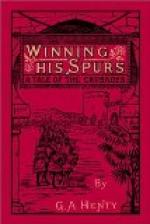“It may be,” Cnut said, “that the door has not been opened as you say for years, but it is certain,” and he placed his torch to the hinges, “that it has been well oiled within the last two or three days. No doubt the baron intended to make his escape this way, should the worst arrive. Now that we have the door open we had better wait quiet until the dawn commences. The earl will blow his bugle as a signal for the advance; it will be another ten minutes before they are fairly engaged, and that will be enough for us to break open any doors that there may be between this and the castle, and to force our way inside.”
It seemed a long time waiting before the dawn fairly broke—still longer before the earl’s bugle was heard to sound the attack. Then the band, headed by Cnut and two or three of the strongest of the party, entered the passage.
Cuthbert had had some misgivings as to his mother’s injunctions to take no part in the fray, and it cannot be said that in accompanying the foresters he obeyed the letter of her instructions. At the same time as he felt sure that the effect of a surprise would be complete and crushing, and that the party would gain the top of the keep without any serious resistance, he considered the risk was so small as to justify him in accompanying the foresters.
The passage was some five feet high, and little more than two feet wide. It was dry and dusty, and save the marks on the ground of a human foot going and returning, doubtless that of the man who had oiled the lock the day before, the passage appeared to have been unused from the time that it left the hands of its builders.
Passing along for some distance they came to another strong oaken door. This, like the last, yielded to the efforts of the crowbars of the foresters, and they again advanced. Presently they came to a flight of steps.
“We must now be near the castle,” Cnut said. “In fact, methinks I can hear confused noises ahead.”
Mounting the steps, they came to a third door; this was thickly studded with iron, and appeared of very great strength. Fortunately the lock was upon their side, and they were enabled to shoot the bolt; but upon the other side the door was firmly secured by large bolts, and it was fully five minutes before the foresters could succeed in opening it. It was not without a good deal of noise that they at last did so; and several times they paused, fearing that the alarm must have been given in the castle. As, however, the door remained closed, they supposed that the occupants were fully engaged in defending themselves from the attacks of the earl’s party.
When the door gave way, they found hanging across in front of them a very thick arras, and pressing this aside they entered a small room in the thickness of the wall of the keep. It contained the merest slit for light, and was clearly unused. Another door, this time unfastened, led into a larger apartment, which was also at present unoccupied. They could hear now the shouts of the combatants without, the loud orders given by the leaders on the walls, the crack, as the stones hurled by the mangonels struck the walls, and the ring of steel as the arrows struck against steel cap and cuirass.




